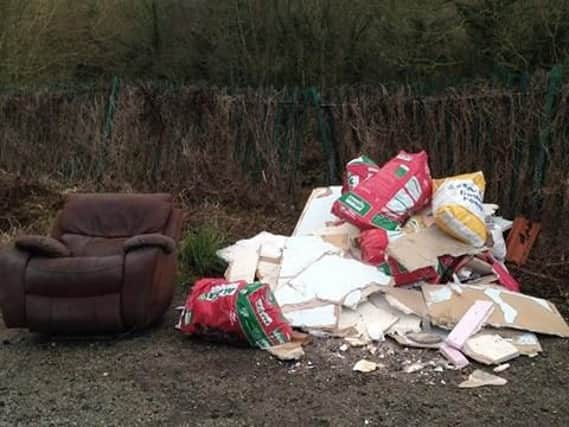County Council's rubble levy 'to blame' for fly-tipping in Harrogate


In August 2014, NYCC introduced charges at its household waste recycling centres to recover costs for the disposal of soil, rubble and plasterboard.
However, Harrogate resident Rowen Hardcastle, has claimed that since then, there has been an increase in people dumping their rubbish in areas such as Nidd Gorge to avoid paying the charges.
Advertisement
Hide AdAdvertisement
Hide AdOn Tuesday, January 12, Ms Hardcastle called Harrogate Borough Council (HBC) to dispose of a large amount of plasterboard and furniture by the car park at Nidd Gorge and complained it was becoming a regular occurrence.
She said: “I walk around this area with my dogs and, in the last few years it’s become a real problem because it’s a quiet area that does not get used that much.
“The council worker who came to collect it said it would cost about £120 to drop that much at the tip. I never thought it would be that expensive.
“It’s getting a lot worse since the charges but surely it’s going to cost a lot more money for the council to take it away than if it was free to dump it at the tip.”
Advertisement
Hide AdAdvertisement
Hide AdKeith Wilkinson, secretary of Bilton Conservation Group, said the group have tried to persuade NYCC to remove the levy after noticing a rise in smaller tradesmen fly-tipping their clients’ rubbish.
However, an NYCC spokesman said there was no evidence of an increase of fly-tipping caused by the introduction of the charges during a review in June 2015.
Alan Taylor, Parks and Street Cleansing manager at HBC agreed there had not been an increase of fly-tipping since the charges but revealed it cost upwards of £20,000 a year for them to remove it.
He said: “In 2014/15 we moved around 300 reports of fly tipping but from April 2015 to now there have been around 250 incidents so it’s around the same level.
Advertisement
Hide AdAdvertisement
Hide Ad“That is still too much for this type of area and I am slightly surprised it hasn’t increased due to the charges. It’s difficult with reducing budgets as we have to pay someone to spent most of their working week clearing it up, as well as paying for a van, fuel and the actual charges at the tip.”